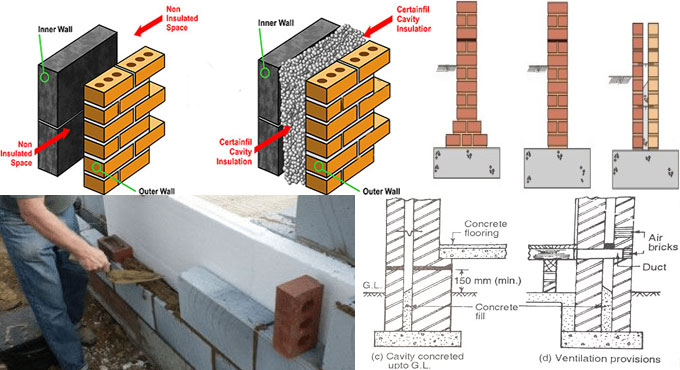
Pros and Cons of a cavity wall Construction

Cavity wall made of double walls and a hollow space exists among them. A wall that is built up with two leaves or skins having a space or cavity among them is titled as a cavity wall. It is generally developed as an outside wall.
Cavity wall thickness of an outside wall and inside wall are equivalent or the inner wall may be deeper as compared to the outer wall. Cavity wall hollow never surpasses 100mm and it is consistent through the height.
The objective of building up a cavity wall is to resist the infiltration of rain to the inner surface of the wall. It is indispensable that cavity walls should not be bridged in any way as this would deliver a passage of moisture.
The masonry skins of a cavity wall belong to brickwork, blockwork or similar. Various types of masonry materials are applied on either side of the cavity. The cavity is primarily empty but is filled with insulation through several methods.
Lots of times are required to build up cavity walls and so little bit expensive to construct as compared to walls having the two skins bonded together. But they have good sound resistance capacity and come with superior sound and heat insulation and most significantly resistance to rain infiltration.
To maintain the longevity, strength and appearance, a damp resistant course of brick or block should be used for building up the cavity wall above ground level.
To resolve this issue, it is required to fill the cavity underneath ground level with a weak mix of concrete so that a solid wall is formed on the ground.
Benefits of cavity wall construction: Damp Prevention: Cavity wall controls the prevention of dampness from outer surface to interior of the building in an efficient manner as compared to a solid brick wall of the similar thickness.
Heat Insulation: As air is a bad conductor of heat, a cavity wall reduces the heat transmission significantly to sustain unvarying temperature inside the building.
Sound Insulation: Sound waves can move rapidly in solid media relating to air, the cavity wall constructions significantly reduces the noise from outside as well as inside the building to get rid of external disturbances.
Economical: The construction cost of a cavity wall is about 20% less than the construction cost of a solid wall having the same thickness.
It has the capability to resist a driving rain in all situations from entering to the inner wall.
Drawbacks of cavity walls
a. A high standard of design and workmanship is required to make a good construction wall
b. Good supervision is necessary throughout construction.
c. The requirement of a vertical damp proof course to all openings
d. The construction cost is little higher as compared to a standard one brick thick wall.
To gather more information, click the following link.constructiontuts.com


